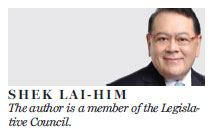'Non-cooperation' undermines Hong Kong's competitiveness
Updated: 2015-02-04 10:02
By Shek Lai - Him(HK Edition)
|
|||||||||
The processing of funding requests on infrastructure by the Legislative Council has been significantly delayed since 2013. Compared with a total of HK$90 billion in public project funding settled in 2012, the amount of funding approved in 2013 dropped to HK$3.6 billion. The "non-cooperation campaign", launched by opposition lawmakers, is mainly to blame for this. These lawmakers used every possible delaying tactic, such as filing amendments, repeatedly raising questions and tabling adjournment motions - all in a bid to filibuster the government proposals. This resulted in much livelihood-related funding being delayed or aborted.
In recent years, instead of targeting only political issues and the budget, the opposition camp changed tactics by targeting the economy and livelihood issues. They launched a "non-cooperation campaign" in the Legislative Council. The opposition pledged to oppose, and even paralyze, the government by any means. Hong Kong's infrastructure projects, which should be vigorously promoted, have now sadly been disrupted by on-going political wrangling.
Traditionally, political and economic agendas were discussed separately in the Legislative Council. Legislators with dissenting political standpoints used to have heated debates regarding political issues. However, when dealing with issues related to the economy and people's livelihoods, they always returned to rational discussion and ensured these issues were resolved through cooperation, rather than confrontation.
In the past, when opposition lawmakers were criticized for opposing anything for the sake of it, they would claim they were playing a supportive role in discussions of non-political issues. Unfortunately, opposition lawmakers have now completely abandoned this approach by going all-out with their "non-cooperation campaign". They attempt to use this as a bargaining chip to advance their demands for "genuine democracy". If this campaign continues, it will hinder the government from discharging its duties and force society to pay a heavy price.

The funding of infrastructure projects is a pressing issue not only relating to the economy and people's livelihoods, it concerns Hong Kong's competitiveness and long-term development. In my opinion, political demands should never be pursued this way. After all, political reform is just one aspect of Hong Kong's development. To pursue democracy and universal suffrage at the city's expense is intolerable. The SAR will suffer greatly if this happens.
The government and citizens have always attached great importance to the competitiveness of Hong Kong. When rating agencies release their latest rankings on the competitiveness of world cities the subject is always keenly discussed.
The reason we all treasure the city's competitiveness is that if Hong Kong fails to retain its competitive edge, we all know it will struggle to survive. Hong Kong has few advantages in terms of land or resources. But it does have a robust system of the rule of law, a high degree of efficiency and productivity, an excellent geographical position and outstanding infrastructure projects. These things explain why Hong Kong is usually ranked among the most competitive cities in the world. Hong Kong must continue to boost its competiveness by using all its assets. Otherwise, it will suffer a rapid decline in an increasingly competitive international environment.
Actually, due to the government's continuous investment in infrastructure, more space has been created for further development. Traffic congestion has been reduced and social, cultural and commercial activities can be conducted in a convenient manner. More importantly, funding in infrastructure has increased integration between Hong Kong and cities in adjacent areas. Also, Hong Kong's status as an international city has been well consolidated. Sustainable development can be expected in future supported by the further infrastructure funding.
Moreover, infrastructure funding has great significance in improving people's livelihoods. A larger supply of land is the best way to tackle Hong Kong's land shortage and housing problems - which has long concerned people. This, however, can only be accomplished through infrastructure projects. If funding requests for infrastructure are hindered, expanding the supply of land will be delayed.
Cost overruns in recent public projects have been heavily criticized. Public projects are usually launched after repeated discussion and consultation. They usually meet the necessary requirements and withstand the test of time. Unfortunately, delays in funding mean costs will keep rising. With increasingly higher costs, funding requests are less likely to gain approval. Construction costs for the Tseung Kwan O landfill, for example, have risen by HK$100 million. Public money should always be used fairly and wisely. Those who try to obstruct or hinder funding of public projects are highly irresponsible because they are also wasting taxpayers' money.
(HK Edition 02/04/2015 page10)